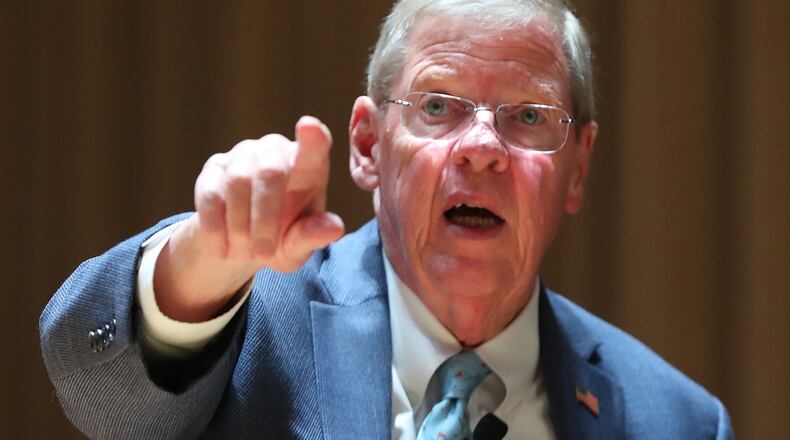As congressional leaders stared down one another during this weekend’s government shutdown, the office of Maine U.S. Sen. Susan Collins hummed.
Crammed inside at one point or another were roughly two dozen senators from both parties seeking to hammer out a deal that would turn the feds’ lights back on and forge a path forward on immigration, the outside issue that has bogged down the spending negotiations.
One member of that ad hoc group was Georgia’s three-term Republican U.S. Sen. Johnny Isakson, a veteran of past immigration talks and an institutionalist frustrated by Capitol Hill’s recent paralysis.
“I have no problems whatsoever going to meetings with people with diverse interests and positions, as long as everybody’s interested in the country and the future,” he said.
The group ended up being a driving force in the agreement that led to the Monday vote to reopen the government.
What they came up with was modest: Democrats would agree to fund federal agencies through Feb. 8 in exchange for a promise from Senate GOP leaders to debate and vote on immigration legislation in the weeks ahead. But the deal was noteworthy for what it prompted from both sides: an exercise in trust, something that has been in short supply on Capitol Hill in recent years.
Isakson employed the old Russian proverb popularized by President Ronald Reagan to describe how the group approached its negotiations.
“You always trust, but you always verify,” he said.
Isakson's strategy before and during the shutdown diverged in many ways from that of his Georgia colleagues, and particularly his fellow Senate Republican. David Perdue has focused his efforts less on negotiating with Democrats and more on ensuring his ally, President Donald Trump, doesn't dither from many of the strict immigration proposals preferred by his base.
Within hours of the Senate casting an initial vote to reopen the government, Perdue was back at the White House, huddling with Trump and other immigration hawks to discuss next steps on DACA, the Obama-era program the president moved to end that gave legal status to young undocumented immigrants.
“The president wants a deal, I think he’s been more than flexible in terms of what he’s asked for,” Perdue said Monday.
Isakson has been less specific than Perdue about his views on immigration over the last year.
He refused to detail what he would or would not accept related to DACA in an interview earlier this month. He bristled at so-called sanctuary cities, jurisdictions outlawed in Georgia that limit how local police can cooperate with the feds on immigration, as well as the diversity lottery and the country's family-based immigration system, two programs that Perdue has championed ending or overhauling. But Isakson also indicated he was open to making a middle-of-the-road deal with Democrats.
“I’m willing to consider whatever we need to do to get this problem off the table,” he said.
For his part, Isakson on Monday predicted that forging an immigration compromise in the weeks ahead could prove to be “the hardest exercise that any of us have been a part of in a long, long time.”
“I’ve been through a few of these types of issues over the years in my political life and this is one that’s got all the makings of a knock-down, drag-out” fight, he said. “In the end, the Senate floor and the political process in the United States is the way to come to a decision on a tough issue like that.”
About the Author
The Latest
Featured




